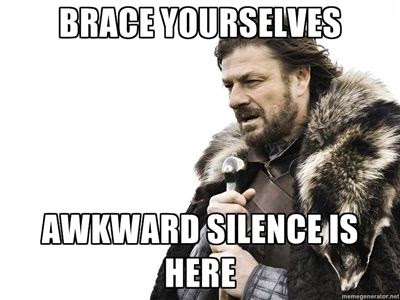Silence Please: How to use silence to your advantage
Silence is perhaps the most underrated negotiation tool. I also find it to be the most challenging. Fun fact: silence begins to feel ‘awkward’ after 4 seconds. Humans are predisposed to dislike long awkward pauses.
Silence is actually a sign of ostracism, and since we feel the need to belong, we dislike these silences. Looking to evolution, if one was ostracized or left out during hunter-gatherer times, they were actually at risk of not having food or protection. It makes sense why we hate these silences.

Since most people feel so uneasy about silence interrupting the flow of a conversation, they will rush to fill the void of silence. This compulsion to fill the void won’t help you negotiate, it will hurt you. Learn to feel comfortable in the silence, and you will gain the advantage in a negotiation.
The whole point of asking for free pizza is to get comfortable asking for more. Now, that ‘extra slice’ can mean something different for everyone. In a low stakes, asking-for-free-pizza practice environment, the whole point is to befriend the discomfort of asking for something you may feel like you don’t deserve. You lean into that discomfort so that it can become your strength. That’s the same way mastering silence works. Lean into the long pauses so that you can practice feeling more comfortable with silence.
Why is it so important to be comfortable with silence? Master negotiators use silence to their advantage in a negotiation. Leonardo Da Vinci is known to have said “Nothing strengthens authority so much as silence.”

Using silence to your advantage will help you in three key ways.
- It will make your counterpart feel uncomfortable, and more likely to give up extra information. Unless they are also a master of silence, they will rush to fill the void. If you are rushing to fill the void, you are more likely to disclose too much information. If you are the one who keeps on talking, you are likely to negotiate against yourself. If you are comfortable with silence, your counterpart is much likely to make one of those mistakes, which gives you the control.
- It builds suspense. Time your pauses well, and your audience will be hanging on every sentence. If you are giving a presentation, it makes the presentation more dynamic.
- It gives you time to think. Sometimes you may need a minute to compose yourself and keep yourself on track. You’re only human, after all! Pausing helps.
As with everything, timing matters. When is it an ideal time to be silent? This is an easy one. In the beginning of a negotiation! Let the other party speak first in a negotiation. Sometimes simply by speaking first, you can negotiate against yourself. What if you are looking to make $50,000, but the other party is willing to offer $60,000? If you speak first, the other person has pocketed the $10,000 that should have gone to you.
Within the realm of negotiation tools, I find silence unique because it’s one of the few techniques that will come easiest for introverts. The world is made for extroverts. The act of negotiating requires a boldness that is more natural for extroverts. But in a negotiation, the person who speaks the least usually has the most power. Extroverts are more likely to rush to fill the void. Because of this, introverts, who don’t shy away from silence, are more likely to have more power in a negotiation.

Back to the example of asking for free pizza, if you are uncomfortable with silence, you probably won’t be able to ask. Imagine asking for free pizza and waiting in silence. If you are uncomfortable with the silence that fills the room, you are less likely to stand by your request. You are more likely to say “just kidding,” or “nevermind!” If you can confidently wait out the silence, you will be a better negotiator.
How can you practice? You don’t need to ask for free pizza to practice using silence to your advantage. Practice using extended pauses in conversations with your friends and your family. Nobody has to know that you are practicing, just give it a shot!